Authors tend to run hot and cold on writing classes and writing books. Some people swear by them. Other writers are either dubious or bordering on hostile toward them. I’m not positive, but I believe these opinions are tied in part to other writing debates about what makes someone a “real” writer, what paths to publishing are most honorable, whether you should call yourself a writer or an author, or if it’s realistic to become a full-time writer/author.
I’m not going to dive into the controversies or opinions mentioned above. I’m not going to discuss classes or degrees this time around either. I am going to talk about writing and creativity books, though.
I do think finding methods to consistently and continually improve your craft as a writer is important. Which methods work best probably cuts along the mentality of the individual, their personality, past experience, and their openness to the process. I find the written word has the most impact on me emotionally, intellectually, and spiritually. Reading fiction and nonfiction improves my toolbox as an author almost as much as the regular practice of writing itself.
A few writing craft and process books loom large in my mind and heart. Some of it has to do with the time in my life in which I read them. I imprinted my emotional and mental state at the time upon the work as I strove to learn from it. Others had to do with the stature of the author giving the advice and guidance. Many of them were inherently good, useful books on writing or the creative process.
If you’re tough to shop for or you’re just tired of getting mugs and t-shirts that say, “Be careful. If you make me mad, I’ll kill you in my story,” then these writing and creativity books may be the thing to ask for this holiday season.
![]() 1. "InkStained" by John Urbancik
1. "InkStained" by John Urbancik
Inkstained: On Creativity, Writing, and Art by John Urbancik discusses finding inspiration in anything you pursue. John Urbancik is an accomplished author and photographer. He is, in my opinion, the greatest short story writer living or dead. He’s still alive by the way. I follow his Patreon page. My favorite John Urbancik story is always the next one I read. This book is packed full on insights on a life in writing and the creative process. If you only get one book on this list, this is it.
Get Inkstained at Amazon
![]() 2. "Writing in the Dark" by Tim Waggoner
2. "Writing in the Dark" by Tim Waggoner
The moment I heard Writing in the Dark was coming, I knew I was going to buy it and it did not disappoint. I’ve been following Waggoner’s writing for years and the great advice he has given online. He is a successful author and has made a name for himself in media tie-ins in particular. He also teaches writing on the collegiate level. His students are lucky to have a teacher who has lived the craft so successfully. This book could be a textbook except that it is too interesting and practical and I’m not sure colleges like that sort of thing.
Get Writing in the Dark at Bookshop or Amazon
![]() 3. "On Writing" by Stephen King
3. "On Writing" by Stephen King
A lot of you probably guessed On Writing would be on this list. I quit teaching in 2013 to become a full-time writer and to care for my son who was sick. My wife bought me this book for my birthday a couple months later. I read it in those heady days when life was still surreal from not having a day job anymore. I was desperate to succeed and I felt like the book had too much information to take in. I read it again recently and found it concise and practical. I suppose I became a different person between readings. Some of the publishing advice for beginning authors is dated and skewed by King’s position on top of a 400 million dollar mountain, but it holds up and the principles are still sound.
Get On Writing at Bookshop or Amazon
![]() 4. "Story" by Robert McKee
4. "Story" by Robert McKee
Story: Substance, Structure, Style and Principles of Screenwriting by Robert McKee is a screenwriting book, but prose authors can learn a ton from this work. S.A. Cosby reminded me of this book recently when I interviewed him for my podcast. Cosby is a crime fiction author who has made a huge impact. Stephen King has mentioned Cosby’s work twice. After rereading Story, I see where Cosby applied these principles to his novels to create amazing scenes, twists, characters, and action. This book could change the quality of your work in a big way.
Get Story at Bookshop or Amazon
![]() 5. "Sweat the Technique" by Rakim
5. "Sweat the Technique" by Rakim
Sweat the Technique discusses the creative process from the viewpoint of legendary rapper Rakim. I read it in paperback, but he narrates the audiobook himself and it might be worth it to experience the book that way. It’s both a memoir and a writing guide. The insights on drawing from influences, finding your own voice and style, and practical guidance on writing are like sitting at the feet of a genius storyteller.
Get Sweat the Technique at Bookshop or Amazon
![]() 6. "A Writer’s Tale" by Richard Laymon
6. "A Writer’s Tale" by Richard Laymon
Whoever buys you this one must love you very much because A Writer’s Tale is out of print and really hard to find. When you do find it, it’s expensive. I probably should have excluded it from the list, but I read it many years ago and found it useful and motivating. I borrowed it from someone who has since passed and I believe that copy was sold shortly after that. Brian Keene reminded me about this book and the next one on the list. Keene tweeted about writing craft books a while back, I couldn’t find the tweet, and he kindly retweeted his list for me. If you can ever find a copy, it’s a special book for a lot of reasons.
Get A Writer's Tale thru Amazon if you're willing to spend 1000 bucks.
![]() 7. "Welcome to Hell" by Tom Piccirilli
7. "Welcome to Hell" by Tom Piccirilli
Brian Keene reminded me about Welcome to Hell: A Working Guide for the Beginning Writer by Tom Piccirilli too. It is short and inexpensive. The book uses Piccirilli’s life and career as a case study for authors to both imitate and avoid from episode to episode. The details are not universal and it is not a step-by-step guide to a writing career, but the principles and lessons are sound and can be adapted to many different career paths.
Get Welcome to Hell at Bookshop or Amazon
![]() 8. "Where Nightmares Come From" by Crystal Lake Publishing
8. "Where Nightmares Come From" by Crystal Lake Publishing
Where Nightmares Come From: The Art of Storytelling in the Horror Genre is part of The Dream Weaver series of books from Crystal Lake Publishing. It contains great essays from some of the most important and skilled storytellers in horror. Even if you are not primarily a horror author, these essays can serve anyone in writing tension, conflict, mystery, action, and more.
Get Where Nightmares Come From at Bookshop or Amazon
![]() 9. "The War of Art" by Steven Pressfield
9. "The War of Art" by Steven Pressfield
The War of Art: Break Through the Blocks and Win Your Inner Creative Battles is a great book for creatives stuck in a rut or otherwise displeased with their process and what they are producing. If you are at a point of struggle and need help getting through it, that’s what this book is about. Many of the books higher on this list can help with that too, I believe.
Get The War of Art at Bookshop or Amazon
![]() 10. "On Writing Horror: A Handbook" by the Horror Writers Association
10. "On Writing Horror: A Handbook" by the Horror Writers Association
On Writing Horror has very good essays from some of the strongest horror authors at the time of its publication. The detailed advice, examples, and exercises are timeless and helpful. It is better for horror-centric writers, but can work for adjacent genres as well. It is not the strongest or best book on this list, but I wouldn’t have included it if it wasn’t worth the read.
Get On Writing Horror at Amazon
We should always strive to be better at what we love, what we are called to do. We benefit by seeking inspiration wherever it can best be found for us. These books might be the answer for you at time in your writing life when you find yourself seeking the way forward. Good luck and good writing.
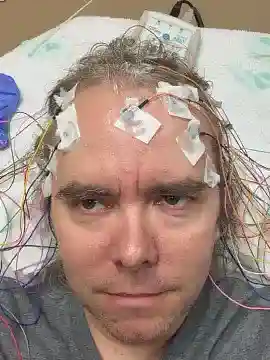
About the author
Jay Wilburn lives with his wife and two sons in beautiful Conway, South Carolina. He is a full-time writer of horror and speculative fiction. Jay left his job as a teacher to become a full time writer and has never looked back. Well, that’s not entirely true. He wants to be sure he isn’t being followed, so he looks back sometimes.
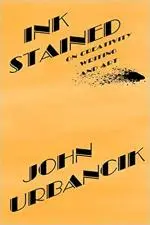 1. "InkStained" by John Urbancik
1. "InkStained" by John Urbancik
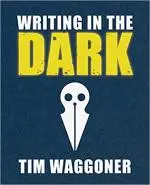 2. "Writing in the Dark" by Tim Waggoner
2. "Writing in the Dark" by Tim Waggoner
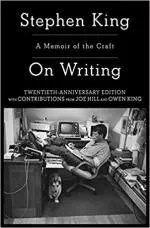 3. "On Writing" by Stephen King
3. "On Writing" by Stephen King
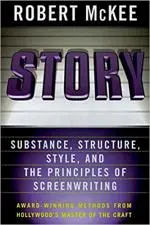 4. "Story" by Robert McKee
4. "Story" by Robert McKee
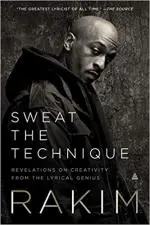 5. "Sweat the Technique" by Rakim
5. "Sweat the Technique" by Rakim
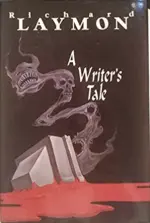 6. "A Writer’s Tale" by Richard Laymon
6. "A Writer’s Tale" by Richard Laymon
 7. "Welcome to Hell" by Tom Piccirilli
7. "Welcome to Hell" by Tom Piccirilli
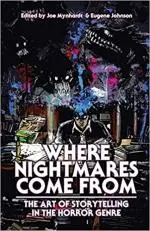 8. "Where Nightmares Come From" by Crystal Lake Publishing
8. "Where Nightmares Come From" by Crystal Lake Publishing
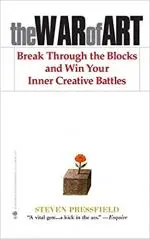 9. "The War of Art" by Steven Pressfield
9. "The War of Art" by Steven Pressfield
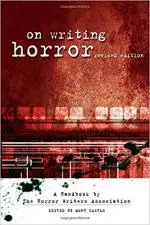 10. "On Writing Horror: A Handbook" by the Horror Writers Association
10. "On Writing Horror: A Handbook" by the Horror Writers Association








